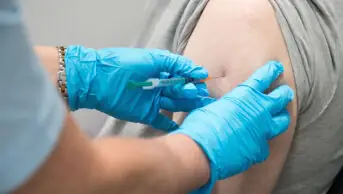COVID-19 vaccine delivery in the UK has taken an inevitable, but precarious, step forward.
From April 2024, community pharmacies will be able to provide private COVID-19 vaccines through Pharmadoctor — a company that offers clinical service packages, including record-keeping software, patient group directions and training, to the pharmacy sector. The announcement on 1 February 2024 was hardly surprising, after pharmaceutical companies suggested in 2023 that their COVID-19 vaccines would be made available for purchase outside of the usual NHS campaigns from the following year.
Still, the additional funding from a private service that is already attracting bookings ahead of launch day cannot come soon enough.
Community pharmacies have long called for more funding through the NHS COVID-19 vaccination service. Most recently, Community Pharmacy England said NHS England’s “inadequate” £2.50 increase to the £7.54 payment per jab still “doesn’t recognise the recent inflationary increases in costs pharmacy owners have suffered” and the rising costs that they will continue to incur in 2024 with the increase to the national minimum wage.
But with a payment of £45 per COVID-19 vaccination under the private service, pharmacies are taking notice. When asked, both Boots and Superdrug told The Pharmaceutical Journal that they are now looking to provide COVID-19 vaccinations privately.
The private service is emerging at an ideal time for patients, ahead of plans to narrow the NHS’s COVID-19 vaccine provision
In addition to the funding, the private service will also afford community pharmacies yet another opportunity to audition for a bigger part in the NHS’s vaccination services. A new strategy published in December 2023 promised “a greater role” for the sector, but it will ultimately be left up to integrated care boards to decide how it will deploy vaccinations locally when these services are delegated in April 2025.
The private service is emerging at an ideal time for patients too, ahead of plans to narrow the NHS’s COVID-19 vaccine provision. In its most recent advice, published on 7 February 2024, the Joint Committee on Vaccination and Immunisation (JCVI) said “that any autumn 2024 campaign would likely be smaller than previous autumn COVID-19 campaigns”. The decision follows a cost-effectiveness analysis of the vaccines, which “will become a major determining factor” in who gets the vaccine free of charge under the NHS service going forward.
While the full analysis for this decision has yet to be published, the JCVI has previously revealed what should be considered a major gap in its modelling. Alongside advice published in October 2023, the JCVI said it did not include the impact of long COVID on non-hospitalised patients in its cost-effectiveness assessment, owing to a lack of “reliable estimates of the vaccine effectiveness” in this group.
Long COVID is an expensive illness for the NHS. An analysis of 472,173 patient records by researchers at the University of Birmingham found in November 2023 that managing the illness outside of hospital costs the UK £23.4m in primary care consultations each year. According to research published in Nature, the highest proportion of these patients are aged between 36 years and 50 years.
The disease can also be expensive for patients. A survey of 3,286 people by the National Institute for Health and Care Research found that 80% of patients said it had affected their ability to work, and 36% said their long COVID symptoms impacted their financial status.
The cost of protection from an illness that has the potential to be financially devastating is only available to those that already have the means to afford it
However, a meta-analysis from the University Health Network in Toronto, Canada, suggests there is some evidence that the expense on both fronts could be avoided with the help of a vaccination. “At least one vaccine dose was associated with a protective effect against long COVID,” the authors said. Another meta-analysis in the BMJ came to similar conclusions.
This creates a substantial potential market for private vaccinations among people who are too young to receive the NHS vaccine but have justifiable concerns about the potential impact of COVID-19 on their life.
But the issue then becomes the £45 price tag. People facing financial struggles are more likely to contract long COVID, which Daniel Altmann and Rosemary Boyton, professors of immunology at Imperial College London, say in the BMJ is the result of “a complex mix of occupational susceptibility … and the disproportionate impact of COVID-19 on socio-economic groups and ethnic minorities”. This means that the cost of protection from an illness that has the potential to be financially devastating is only available to those that already have the means to afford it.
As with any private service, there are clear implications for health inequalities here that need to be addressed early on — particularly as the government continues to invest millions of pounds in reducing them. The availability of COVID-19 vaccines privately is undoubtedly a positive step forward for both pharmacies and patients, but cost considerations need to be taken to avoid making COVID-19 a financially-determined disease. PJ



